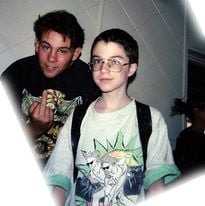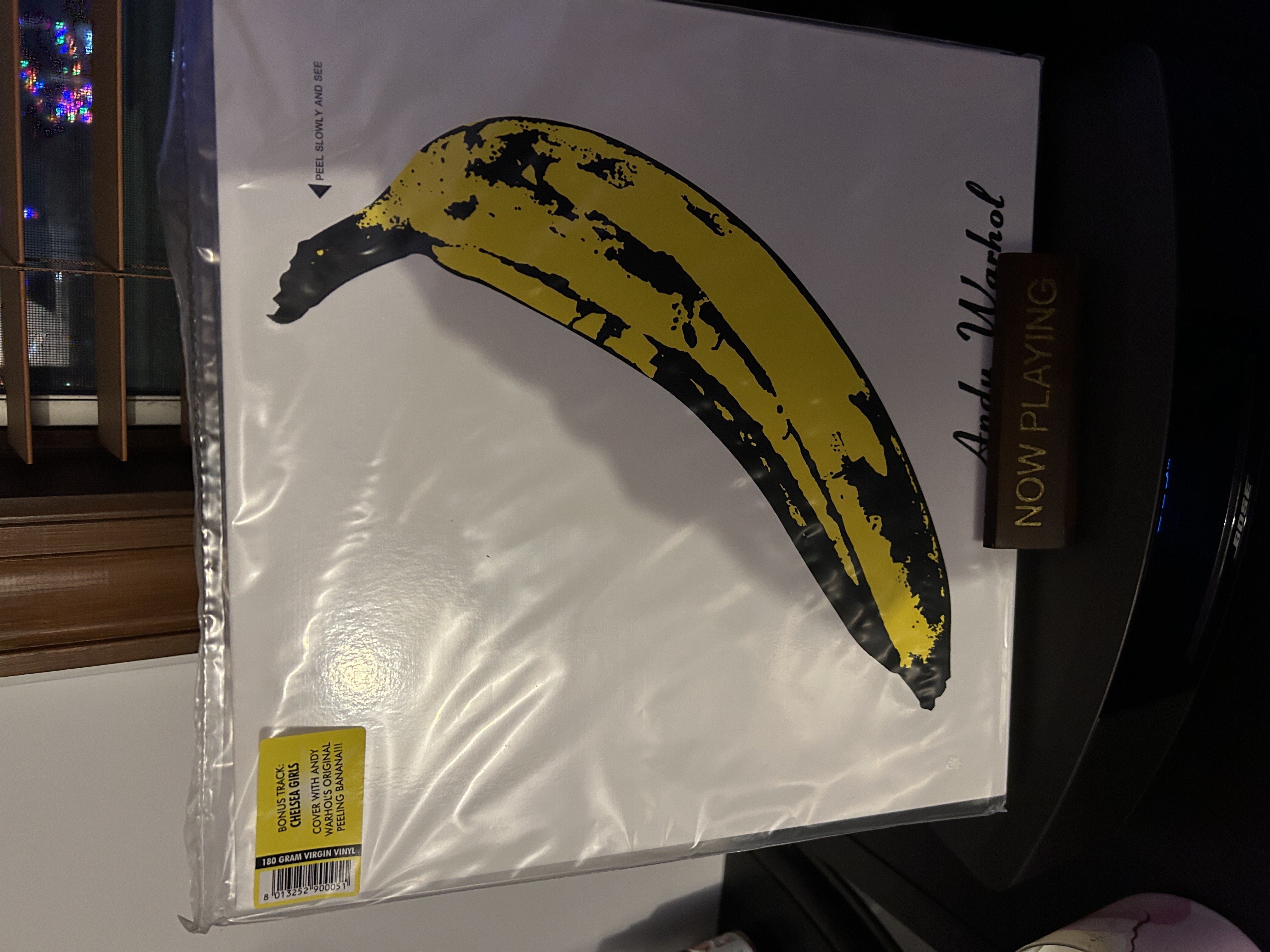
Be Sure to Wear Flowers in Your Hair
Published on Jan 19, 2026
WALK OUT TO WINTER: falling in love with—and to—Aztec Camera's High Land, Hard Rain
Published on Dec 26, 2025
First Anniversary
Published on Dec 17, 2025
Introducing: The IHTOV Zine
Published on Dec 15, 2025
More Liner Notes…
Featured Essay: Learning to Let Go of Things
by Hunter Felt

Confession: Even though I am writing this piece for a site for vinyl collecting, I don’t really have a vinyl collection! There is a reason for that: I was born in 1981 and have never owned a record player. While I have owned 60-70 LPs in my lifetime, I haven’t actually played the majority of them.
So, why do I own them? It started in college during the peak of the CD era when nobody listened to vinyl. It was the last year of the 90s, the tail end of “the End of History.” CDs were how we all listened to music and, as far as we were concerned, that was how it would be for the foreseeable future. By the end of the year, of course, Napster was officially a Thing and that was bad news for compact discs.
For those too young to remember, CDs were extremely efficient ways of storing a lot of music in a tiny amount of space. You didn’t need to turn them over and they required far less maintenance than vinyl. They were extremely utilitarian: if you removed the cases and put them in sleeves you could carry a library full of music with you.
This turned out to be a crucial downside: they were also ultimately, disposable. A CD collection (barring those expensive box sets that are currently keeping the format afloat) simply wasn’t impressive visually. While the albums themselves could survive a beating, the jewel box cases would snap if you looked at them funny. The longer you kept CDs outside of those cases, the more likely it was to scratch. Once that happened? Well, it often meant that you now owned a very expensive and very small frisbee.
My friend Brian was the first of my college friends to realize that MP3s meant that the reign of the CD was over. Influenced by the late Steve Albini, who was convinced that analog was always superior to digital, he began ditching his CDs and replacing them with vinyl. The rest of us thought this was rather extreme, but we went along with it because he was giving away albums and we took advantage of his generosity.
As much as I loved the much-missed Albini—Brian was the first to point out that we were similar both in appearance and argumentative temperament—I still haven’t bought into the blanket statement of analog being superior to digital as a general rule of thumb. However, it was an understandable belief during those first 10-15 years or so of the digital era when the markets were flooded with extremely thin-sounding CD reissues that did sound notably “colder” than the original versions. Maybe it was a trick by record companies to ensure fans would keep having to buy new digital remixes of favorite albums every decade until they finally got it “right.”)
In order to fill out his collection, Brian would take advantage of the glory days of $1 vinyl, and I would sometimes tag along. It’s hard to imagine now when vinyl is about to overtake CDs, but the vast majority of LPs used to be dirt cheap in the late 90s/early 00s after the boomers began selling off their collections. At that price, it felt like it was worth a gamble to spend a lousy buck for an interesting album (or a little bit more for a pristine copy of The Free Design’s Kites Are Fun or Steely Dan’s Pretzel Logic).
Why? Well, it felt good to have vinyl around me even if I often could only imagine the music that was on it. I saw vintage vinyl as gateways to a past, a past that I often felt like I secretly belonged to.
My parents were first hand witnesses to the world during the ’60s revolution, through the assassination of JFK and Beatlemania and the hippie revolution. My dad just missed the cut on being drafted in the Vietnam War. He had stories of the Michigan rock scene of the time: he witnessed an early, disastrous, attempt by Iggy Pop to introduce stage-diving to the masses that effectively ended a Stooges set. My parents had an early date watching a local production of “Hair” where they saw Meat Loaf’s “meat loaf" (that’s a genuine Dad Joke from my childhood).
As a result, my parents had (and continue to have, to my knowledge) an amazing vinyl collection. I didn’t realize that until I became a rock geek in my adolescence. Starting around middle school, I would flip through the whole thing every few weeks, a new record catching my eye every time.
Later, I would also do this whenever I was at a friend’s house and their parents had a decent LP collection. My friend Joseph got mad at me when I discovered his dad’s copy of The Velvet Underground & Nico and attempted to peel the banana. I know the record collectors reading that just winced at the mere idea of this desecration.

Every few months, our parents took a trip to see their friends Claudette & Chris, who lived a 90-minute mixtape drive away. Whenever I could, I would eagerly dig through their extensive collection. I have a vivid (but perhaps unreliable) memory of taking particular delight in seeing a copy of Yes’s Tales From Topographic Oceans in the wild for the first time.
At one point Chris laughed at my LP-flipping ritual. “You do this every time you’re here even though there’s nothing new there.”
“My tastes have changed,” I said.
He laughed at me. Time moves differently when you’re an adult than when you’re a kid. For him it felt like I had just been there last week. For me, every few months I was an entirely different music fan whose curiosity would keep expanding.
Heck, I would still constantly flip through my parents’ vinyl collection even though I had it memorized at one point. I would read liner notes and fantasize about what every album could sound like. I eventually did get some answers. Did Return To Forever’s Romantic Warrior possibly live up to the fantasy novel-like cover? (Yes.) Did anything else on Herbie Hancock’s Future Shock sound like Rock-It? (No.) Was Bob Dylan’s Self-Portrait as bad as the critics said it was? (No, but it wasn’t good either.)
This is how life would go for a while and it seemed like it would go on indefinitely until it didn’t.
One day, Chris unexpectedly left Claudette and it was like he no longer existed. It was a difficult event to process for someone who hated change and had serious abandonment issues already. Suddenly it was no longer “Claudette and Chris,” just Claudette. As far as I know, nobody in my family had contact with him from that point on. I hated him for the pain he caused them, it was a cruel thing to just leave behind your family without warning.
Yet I missed him, oddly enough. He was an authority figure I sought to impress—charming in a way that always reminded me of Jack Nicholson—and now it was like he never existed at all. The one thing he left behind was a John Zorn CD of his I had borrowed before he left—neither of them was a fan of noisy, hardcore-inspired avant-garde jazz while I LOVED it—and I figured that Claudette wouldn’t want another reminder of him.
In writing this I learned that Chris passed away a few years ago. As far as I know that purloined copy of Naked City is back in my parents’ house now, along with 70% of my CD collection. It’s okay, I don’t really listen to them that much anymore. Just like Brian did over two decades ago, I learned to let go of the objects I used to obsessively collect.
In a former life, Hunter Felt was a sportswriter for The Guardian US. Before that, they reviewed CDs for PopMatters when CDs were the things that carried music. If you want to hear their thoughts about music and many other things please subscribe to their Patreon.

